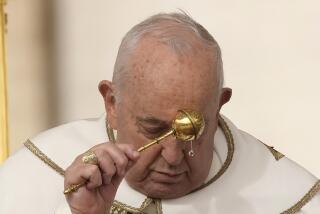Pope, at Mass for 300,000, Asks Lebanese to Exemplify Peaceful Coexistence
BEIRUT — Against the stark backdrop of Beirut’s war-shattered skyline, Pope John Paul II brought 300,000 Lebanese Christians and Muslims together Sunday for a Roman Catholic Mass, urging them to renew their country’s “historical mission” as a model of coexistence.
“Lebanon has shown [before] that these different faiths can live together in peace, brotherhood and cooperation,” he said in a homily near the infamous Green Line that divided Beirut’s warring Christian and Muslim sectors.
The huge seaside gathering, which surpassed the pontiff’s tumultuous welcome Saturday and drew nearly one-tenth of Lebanon’s population, was the pinnacle of a 32-hour visit that united, if only briefly, most political factions in a nation struggling to recover from 16 years of civil war.
In a more controversial message, the pontiff demanded Lebanon’s “total independence” but did not spell out what he clearly meant: a withdrawal of the 35,000 Syrian troops that intervened in 1991 and of 2,000 Israeli soldiers battling pro-Iranian Hezbollah guerrillas in southern Lebanon.
The civil war, which cost more than 150,000 lives, left Lebanon’s once-majority Christians defeated, divided and reduced to the short end of a power-sharing deal with Muslims in a postwar government dominated by Syrian overlords.
Maronites, who are affiliated with the Roman Catholic Church but have their own liturgy, are the most numerous of Lebanon’s Christians, who make up no more than 45% of the country’s 3.2 million people. Their church is a leading voice of anti-Syrian protest.
One reason for John Paul’s visit, in fact, was to respond to the recommendations of a 1995 assembly of Lebanese bishops, who called for the pullout of Syrian and Israeli troops and a halt to arbitrary arrests and torture under the postwar government.
“Your presence is a motivation for us to continue with the reconstruction process and a sign that Lebanon will become independent, sovereign and enjoy the power of free decision,” Cardinal Nasrallah Sfeir, the Maronite patriarch, told the pope at the start of Sunday’s Mass.
John Paul’s homily, delivered from a platform on a rubble-strewn landfill by the Mediterranean, was oblique.
“We are gathered near the historic heart of Beirut, Martyrs Square; you have also called it Freedom Square and Unity Square,” said the frail, 76-year-old pontiff, stooped and squinting in the hot, bright sun. “I am certain that the sufferings of the past years will not be in vain. They will strengthen your freedom and unity.”
He also prayed for an end to the continuing “sufferings” of Sidon and Tyre, the main cities in the Israeli-occupied south.
And in three other speeches here, he called for “a more democratic society, with full independence . . . and with recognition of its borders.”
This cannot be achieved, he added, without full participation in civic life--an admonition to Christians who boycott elections in the belief that the political deck is stacked against them.
The pope’s formal reply to the bishops, a written Apostolic Exhortation that was issued Sunday but not read aloud, said the “presence of non-Lebanese armed forces . . . feeds passions, as well as the fear that the values of democracy and civilization [in Lebanon] might be compromised.”
But the 200-page document stopped short of urging those forces to leave.
The Beirut sojourn was the first Middle East trip of John Paul’s much-traveled papacy, and one reason for his caution might have been a reluctance to offend Syria and Israel, countries he hopes to visit by the end of the millennium.
One Vatican official noted that the pope recognizes Syria’s role in having pacified Lebanon.
“There are some situations in which you can put up with a certain evil for a while, as long as they are not permanent,” the official said. “Nobody denies that the Syrians did something to stop the bloodshed in this country. Is this a way of recognizing that Lebanon is a new province of Syria? No.”
Many Christians, though buoyed by the pope’s presence, were disappointed by his restraint.
“His coming is a victory for us because it confirms our faith, but we really don’t expect any real reconciliation,” said Nadine Barakat, a university student. “Our Syrian neighbors are too strong. They allow us too few rights.”
But the pope’s enthusiastic reception by Christians and Sunni and Shiite Muslims mirrored an official acceptance of the visit by nearly all Lebanese factions--and a common hope that it will help the country achieve stability and reconstruction.
Even Hezbollah, a radical Shiite group that operates a political party in Beirut, welcomed his presence “with hearts filled with love and minds open to dialogue,” in the words of its spiritual leader, Sheik Mohammed Hussein Fadlallah.
Thousands of Muslims were also present, including Prime Minister Rafik Hariri and Nabih Berri, the speaker of the National Assembly.
But the pope also witnessed signs of the animosity that lingers among Lebanon’s 18 religious sects.
A poster held up along the papal route showed Christian militia leader Samir Geagea, his face emblazoned on a cross. Geagea has been sentenced to life imprisonment for killing rivals, and many Christians demand his freedom because he is the only leader punished for his conduct in the civil war.
More to Read
Sign up for Essential California
The most important California stories and recommendations in your inbox every morning.
You may occasionally receive promotional content from the Los Angeles Times.










